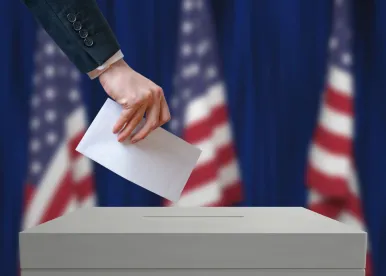With Election Day just around the corner, we are highlighting some of the issues facing employers in a series of posts on election-related issues. In our first installment, we looked at employee protections around political speech and activity both in and outside the workplace. In this second installment, we’ll examine employees’ rights to take time off to vote or engage in other political activities.
Voting Leave Laws.
Approximately thirty states require that employers provide their workers with time off to vote. Twenty-one of these states require that the leave be paid. The exact contours of these laws – such as the amount of leave, notice requirements, and whether there is an exception when the employee has sufficient time outside of working hours to vote – vary by state. For example:
Several states, including New York and California, require that employers post a notice of employees’ right to take leave in a conspicuous location at least ten days before the election. Sample notices have been published by the New York State Board of Elections and the California Secretary of State.
-
In New York, employers must provide leave to employees who do not have sufficient time outside of working hours to vote. An employee is deemed to have sufficient time to vote if the polls are open for four consecutive hours before or after the employee’s shift. Employees who do not have a four-hour window are only eligible for the amount of leave that will – when added to their voting time outside working hours – enable them to vote. Up to two hours of this time must be without loss of pay. Employees may take time off for voting only at the beginning or end of their shift, as designated by the employer, unless otherwise mutually agreed to between the employee and employer. Employees who will need time off to vote may be required to notify their employer between two and ten working days before the election.
-
Similarly, in California, employees are entitled to sufficient time off to vote, up to two hours of which must be paid. Unless the employer and employee agree otherwise, the employee must take the leave at the beginning or end of the employee’s shift, whichever allows the most time to vote and the least time off from work. Employees are required to provide notice that time off to vote is needed at least two working days before the election.
-
In Illinois, employers must provide two hours of paid voting leave, provided that the employee provides notice of the need for leave before the day of the election. Leave is only available to employees whose shifts begin less than two hours after the opening of the polls and end less than two hours before the closing of the polls.
-
In Massachusetts, employees of “manufacturing, mechanical and mercantile establishments” are, upon request, entitled to two hours of unpaid leave after the opening of the polls.
Other Political Leave Laws.
Some states require that employers provide leave for political-related reasons outside of the voting context. For example:
-
Alabama, Delaware, Illinois, Kentucky, Nebraska, Ohio, Virginia, and Wisconsin require that certain employers provide unpaid leave for employees to serve as election judges or officials on Election Day. In Minnesota, employees are entitled to paid leave; however, employers may reduce an employee’s salary or wages by the amount the employee receives as compensation for their service as an election judge.
-
Minnesota and Texas require that certain employers provide employees with unpaid leave to attend party conventions and/or party committee meetings.
-
Connecticut, Iowa, Maine, Nevada, Oregon, South Dakota, and Vermont require that certain employers provide employees with an unpaid leave of absence to serve as elected members of state government. In Iowa, employees are also entitled to leave to serve in a municipal, county, or federal office. And in Vermont, employees may take unpaid leave to vote in annual town hall meetings
Some of these laws only apply to larger employers. For example, in Nevada, employers with at least fifty employees are required to provide leave for employees to serve as members of the state legislature. State laws also vary with respect to the amount of notice that employees must provide to their employers in order to be eligible for leave.





 />i
/>i

